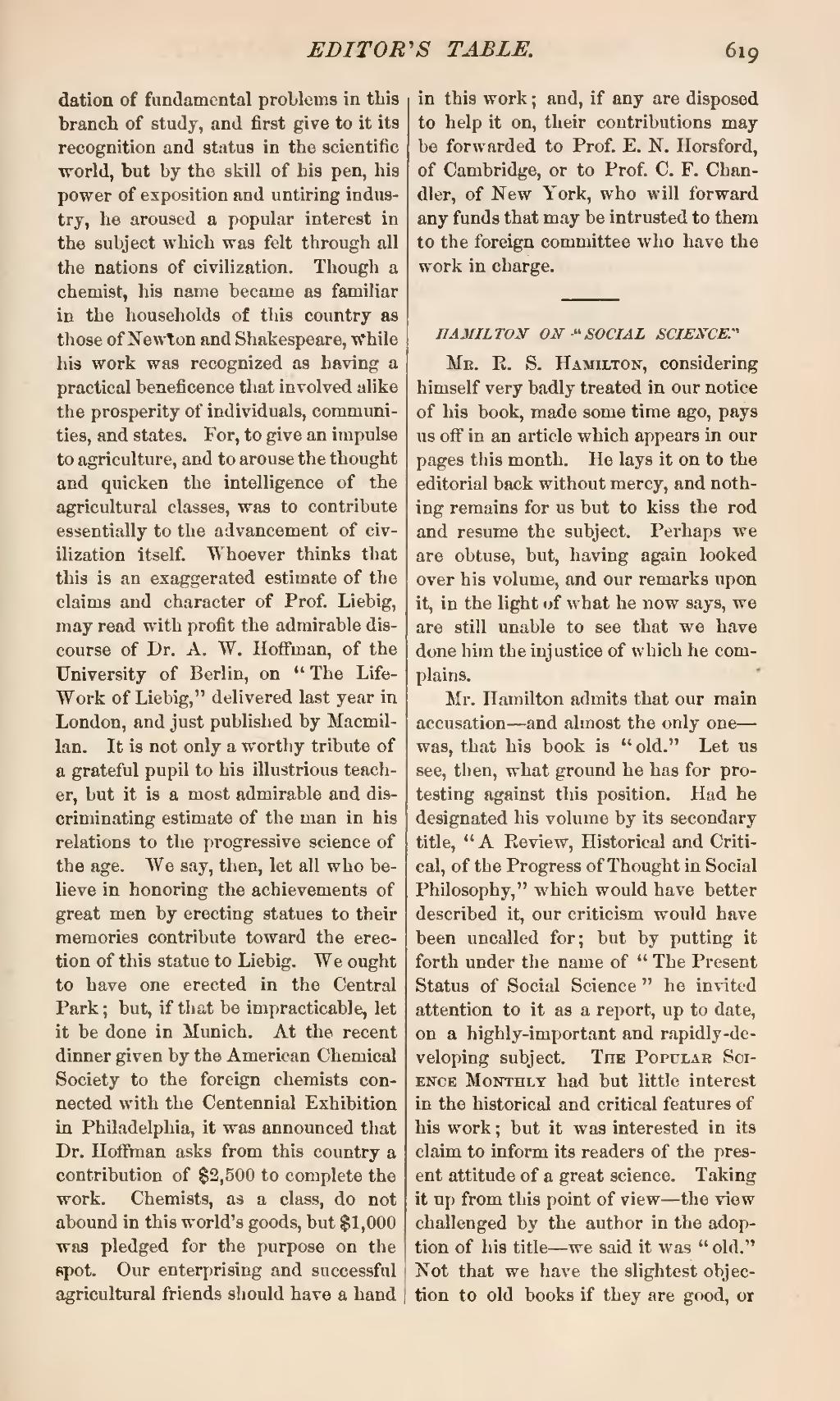dation of fundamental problems in this branch of study, and first give to it its recognition and status in the scientific world, but by the skill of his pen, his power of exposition and untiring industry, he aroused a popular interest in the subject which was felt through all the nations of civilization. Though a chemist, his name became as familiar in the households of this country as those of Newton and Shakespeare, while his work was recognized as having a practical beneficence that involved alike the prosperity of individuals, communities, and states. For, to give an impulse to agriculture, and to arouse the thought and quicken the intelligence of the agricultural classes, was to contribute essentially to the advancement of civilization itself. Whoever thinks that this is an exaggerated estimate of the claims and character of Prof. Liebig, may read with profit the admirable discourse of Dr. A. W. Hoffman, of the University of Berlin, on "The Life Work of Liebig," delivered last year in London, and just published by Macmillan. It is not only a worthy tribute of a grateful pupil to his illustrious teacher, but it is a most admirable and discriminating estimate of the man in his relations to the progressive science of the age. We say, then, let all who believe in honoring the achievements of great men by erecting statues to their memories contribute toward the erection of this statue to Liebig. We ought to have one erected in the Central Park; but, if that be impracticable, let it be done in Munich. At the recent dinner given by the American Chemical Society to the foreign chemists connected with the Centennial Exhibition in Philadelphia, it was announced that Dr. Hoffman asks from this country a contribution of $2,500 to complete the work. Chemists, as a class, do not abound in this world's goods, but $1,000 was pledged for the purpose on the spot. Our enterprising and successful agricultural friends should have a hand in this work; and, if any are disposed to help it on, their contributions may be forwarded to Prof. E. N. Horsford, of Cambridge, or to Prof. C. F. Chandler, of New York, who will forward any funds that may be intrusted to them to the foreign committee who have the work in charge.
HAMILTON ON "SOCIAL SCIENCE."
Mr. E. S. Hamilton, considering himself very badly treated in our notice of his book, made some time ago, pays us off in an article which appears in our pages this month. He lays it on to the editorial back without mercy, and nothing remains for us but to kiss the rod and resume the subject. Perhaps we are obtuse, but, having again looked over his volume, and our remarks upon it, in the light of what he now says, we are still unable to see that we have done him the injustice of which he complains.
Mr. Hamilton admits that our main accusation—and almost the only one—was, that his book is "old." Let us see, then, what ground he has for protesting against this position. Had he designated his volume by its secondary title, "A Review, Historical and Critical, of the Progress of Thought in Social Philosophy," which would have better described it, our criticism would have been uncalled for; but by putting it forth under the name of "The Present Status of Social Science" he invited attention to it as a report, up to date, on a highly-important and rapidly-developing subject. The Popular Science Monthly had but little interest in the historical and critical features of his work; but it was interested in its claim to inform its readers of the present attitude of a great science. Taking it up from this point of view—the view challenged by the author in the adoption of his title—we said it was "old." Not that we have the slightest objection to old books if they are good, or

